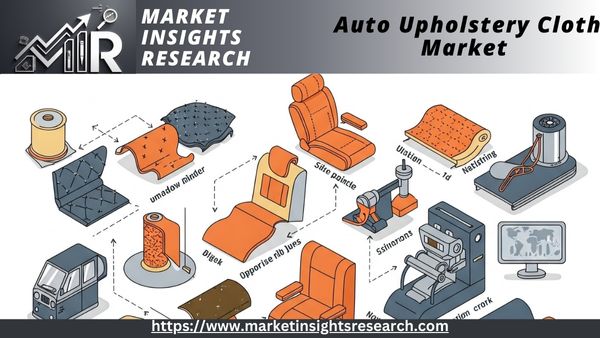Auto Upholstery Cloth Market Size By Material Type (Polyester, Nylon, Leather, Vinyl, Others), By Application (Passenger Cars, Commercial Vehicles, Heavy-Duty Vehicles), Industry Analysis Report, Regional Outlook, Growth Potential, Price Trends, Competitive Market Share & Forecast, 2025 – 2035
Auto Upholstery Cloth Market Size
The Auto Upholstery Cloth Market is poised for steady expansion, projected to grow from approximately USD 4.2 billion in 2025 to about USD 6.8 billion by 2035, at a CAGR of 5.5%.
Download Sample Ask for Discount Request Customization
To get key market trends
Rising consumer demand for enhanced comfort, aesthetic appeal, and sustainability in vehicle interiors is a major growth driver. Technological advancements are enabling the development of innovative fabrics that are stain-resistant, fire-retardant, and eco-friendly. The growing popularity of electric vehicles (EVs) and hybrid cars, which prioritize lightweight and high-performance interiors, is also fueling demand for advanced upholstery materials. As customization trends gain momentum, both OEMs and aftermarket players are offering diversified options for consumers seeking personalized vehicle interiors.
Market Overview
The Auto Upholstery Cloth Market covers a wide range of fabrics and materials used for automotive interiors, including seats, door panels, dashboards, and headliners. Traditionally dominated by materials like leather and vinyl, the market is now shifting toward more sustainable and high-performance fabrics, including recycled polyester and bio-based fibers. The increasing integration of design innovation with comfort, durability, and regulatory compliance is shaping product offerings. Geographically, Asia-Pacific remains the largest and fastest-growing region due to the booming automotive production hubs in China, Japan, South Korea, and India, while North America and Europe continue to innovate in terms of premium and eco-friendly upholstery.
Market Analysis
The auto upholstery cloth industry is heavily influenced by increasing vehicle production, particularly in emerging economies, and consumer demand for personalized vehicle interiors. Luxury and mid-segment vehicles are seeing a greater emphasis on using high-end upholstery materials. However, premium material costs and stringent regulatory standards regarding emissions and recyclability pose challenges for market players. Opportunities lie in the rising popularity of electric and autonomous vehicles, which are spurring demand for lightweight, innovative upholstery solutions. Emerging technologies like smart textiles — fabrics that can regulate temperature or track occupant health — are set to revolutionize the next generation of automotive interiors.
Report Attributes & Details
|
Report Attribute
|
Details
|
|
Market Size (2025)
|
USD 4.2 Billion
|
|
Market Size (2035)
|
USD 6.8 Billion
|
|
CAGR (2025–2035)
|
5.5%
|
|
Base Year
|
2024
|
|
Forecast Period
|
2025–2035
|
|
Historical Data
|
2018–2023
|
|
Segments Covered
|
Material Type, Application, Vehicle Type, Region
|
|
Material Types
|
Polyester, Nylon, Leather, Vinyl, Others
|
|
Applications
|
Seats, Door Panels, Dashboards, Headliners, Others
|
|
Vehicle Types
|
Passenger Cars, Commercial Vehicles, Heavy-Duty Vehicles
|
|
Regional Coverage
|
North America, Europe, Asia-Pacific, Latin America, Middle East & Africa
|
|
Key Market Drivers
|
Demand for premium interiors, sustainability trends, rise of EVs
|
|
Key Market Challenges
|
High cost of premium materials, regulatory compliance pressures
|
|
Key Opportunities
|
Smart textiles, customized vehicle interiors, eco-friendly materials
|
|
Major Players
|
Lear Corporation, Adient plc, Toyota Boshoku Corporation, Faurecia, Sage Automotive Interiors
|
What are the growth opportunities in this market?

Download Sample Ask for Discount Request Customization
Recent Developments
-
Lear Corporation introduced new sustainable and vegan upholstery materials targeted at EV manufacturers.
-
Adient plc expanded partnerships with Asian automakers to deliver customizable, eco-friendly interior solutions.
-
Faurecia invested in smart textile R&D, focusing on fabrics that monitor temperature and adjust seat ventilation.
-
Sage Automotive Interiors launched a new collection of bio-based and recycled polyester fabrics for luxury vehicles.
-
Toyota Boshoku Corporation incorporated antimicrobial textiles into their new seat designs to enhance passenger hygiene, responding to post-pandemic demands.
Regional Insights
-
Asia-Pacific leads the global market, driven by massive automotive production, urbanization, and rising disposable incomes. China, Japan, and India are key contributors.
-
North America focuses heavily on premium vehicles and sustainability, with major investments in luxury interiors and smart fabrics.
-
Europe emphasizes sustainable production practices and innovative designs, aligning with strict environmental regulations and luxury vehicle trends.
-
Latin America shows steady growth, supported by an expanding automotive aftermarket.
-
Middle East & Africa are emerging regions, with increasing demand for durable and climate-resistant upholstery materials.
Key Growth Drivers
-
Growing Automotive ProductionRising vehicle manufacturing globally, especially in emerging economies.
-
Consumer Demand for Premium InteriorsPreference for high-end, comfortable, and customized car interiors.
-
Sustainability TrendsShift towards eco-friendly and recyclable upholstery materials.
-
Rise of Electric and Hybrid VehiclesIncreased demand for lightweight and innovative materials for energy-efficient designs.
-
Smart Fabrics InnovationDevelopment of upholstery integrated with temperature regulation, self-cleaning, and occupant health monitoring features.
Download Sample Ask for Discount Request Customization
List of Key Players
Industry Background
Historically, automotive interiors prioritized durability over design and comfort. However, evolving consumer preferences have transformed the auto upholstery cloth industry into a highly innovative sector. Companies are investing heavily in R&D to develop materials that balance aesthetics, performance, and environmental sustainability. The industry is also embracing 3D knitting, digital textile printing, and bio-fabric innovations to meet demands for customization and eco-friendliness. Key players such as Lear Corporation, Adient plc, Toyota Boshoku Corporation, Faurecia, and Sage Automotive Interiors dominate the market, constantly pushing the envelope through material innovation, sustainability initiatives, and strategic partnerships with automakers.
Market Segmentation
By Material Type
By Application
By Vehicle Type
By Distribution Channel
By Region
-
North America
-
Europe
-
Asia-Pacific
-
Latin America
-
Middle East & Africa

